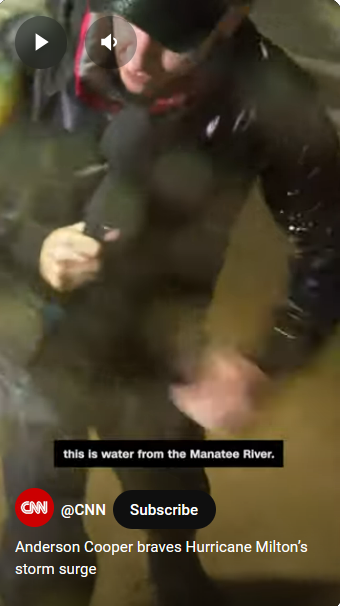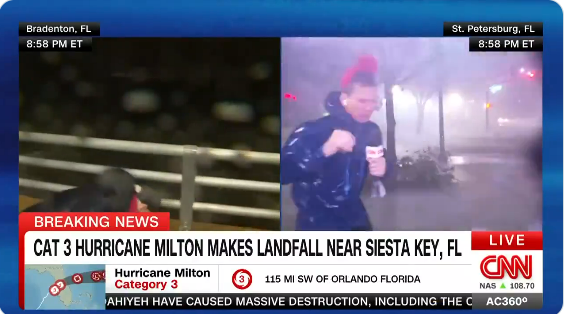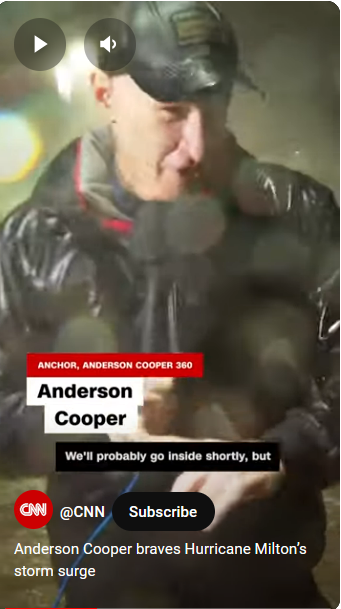On the evening of Wednesday, October 9, 2024, CNN’s Anderson Cooper was live on the scene as Hurricane Milton, a Category 3 storm, made a devastating landfall along the Florida coastline. Known for his fearless on-the-ground reporting, Cooper found himself in a dangerous situation when debris struck him mid-broadcast, prompting fans to express grave concerns about his safety.

The Incident in Bradenton: A Close Call with Flying Debris
Reporting from Bradenton, a coastal city south of Tampa, Cooper was documenting the hurricane’s impact when he was hit by debris. Hurricane Milton, which had strengthened to Category 5 before landfall, brought heavy rain, violent winds, and towering storm surges. As Cooper stood amidst the chaos, the powerful winds hurled an object at him, causing him to momentarily lose his composure.
Describing the scene, he reported, “At the water now, and it’s really starting to pour over,” as massive waves crashed and fierce winds surrounded him. After a sudden blow to his face, he exclaimed, “Woah, OK, that wasn’t good,” adding that he would soon take shelter indoors. The brief but intense moment stirred concern among viewers who quickly took to social media to voice their worries.
Fan Reactions: Concern for Cooper’s Safety
Within moments of the incident, fans shared their thoughts and fears on platforms like Twitter. One concerned viewer tweeted, “I am very concerned for his safety!” while another, clearly anxious, shouted, “NO. HE NEEDS TO GET INSIDE. HE HAS CHILDREN TO THINK OF!” The storm was causing distress not only for those in its path but also for those watching from a distance, worried for Cooper and other journalists risking their safety to bring live updates.
One viewer expressed frustration with CNN, saying, “We get it, now get your people to safety!” Another commented, “Why is Anderson out there?” while a more empathetic viewer shared, “That is so scary. I pray for everyone to be as safe as possible.” Their collective concern reflects the intense connection audiences feel with field reporters who put themselves in harm’s way during such events.
Hurricane Milton’s Destructive Path and Ongoing Danger
As Hurricane Milton swept through Florida, it unleashed catastrophic destruction along its path. Reports of structural damage poured in as the storm surged over coastal areas. Bill Weir, another CNN correspondent, was stationed in St. Petersburg and faced similarly treacherous conditions. Weir’s live broadcast showed him battling fierce winds and lashing rain, even losing his red cap to a sudden gust.
Meanwhile, St. Petersburg resident Makenna Caskey and her aunt narrowly escaped disaster when a crane in their downtown neighborhood collapsed, striking a nearby building. “The crane fell just about a hundred feet away from our building,” she explained, relieved but shaken by how close they came to danger.

Anderson Cooper reporting live on Hurricane Milton, from a clip dated October 9, 2024 | Source: Youtube/@CNN
In a heartbreaking twist, the storm caused fatalities in a mobile home retirement community in St. Lucie County, on Florida’s eastern coast. Sheriff Keith Pearson confirmed that rescue teams were actively working to locate survivors, but several deaths were suspected. The combined effects of tornadoes, heavy flooding, and the relentless winds of Hurricane Milton have left hundreds of homes and lives devastated.
Anderson Cooper’s Commitment to Telling Stories of Human Resilience
Anderson Cooper is no stranger to reporting from disaster zones, but his dedication goes beyond mere coverage. He is known for his empathetic approach, making sure he conveys not only the facts but also the human side of tragedy. Reflecting on his career, Cooper has spoken about the importance of maintaining a connection to humanity, even amidst chaotic and challenging situations.
During a public speaking event, Cooper shared a personal experience from covering conflicts in Rwanda, where he found himself detaching from the realities of death and destruction. He explained that he made a conscious decision to stay emotionally present, not allowing himself to become numb to the suffering he was witnessing. “You need to feel it,” he emphasized. “That’s what allows you to tell the story well.”

Bill Weir ventured into Hurricane Milton for a live report, from a clip dated October 10, 2024 | Source: X/brianstelter/
This approach is evident in his reporting style, where he often takes the time to speak with survivors, to listen to their stories, and to ensure their voices are heard. He has long encouraged aspiring journalists to connect deeply with the people they’re covering, conveying a level of respect and understanding that is sometimes missing in disaster reporting.
Lessons in Journalism: Cooper’s Advice to Aspiring Reporters
Anderson Cooper’s dedication to his craft has made him a role model for many young journalists. He frequently advises students and aspiring reporters to seek opportunities for growth and to embrace the challenging aspects of the field. Cooper’s career journey—from volunteering for assignments that others didn’t want to consistently pushing himself beyond his comfort zone—illustrates the value of persistence and hard work.
At a recent Q&A event, he encouraged students to remain curious, constantly learn, and look for stories that others might overlook. “Make yourself indispensable,” he urged. His advice emphasizes the importance of going the extra mile, of building a deep well of knowledge, and of genuinely caring about the people whose stories they are telling.
Want to know what it feels like to be inside a hurricane? Turn on @CNN. Here's @BillWeirCNN losing his hat a few minutes ago: pic.twitter.com/EZNnpz3K6e
— Brian Stelter (@brianstelter) October 10, 2024
Cooper’s insights resonate not just with journalism students but also with anyone seeking to make an impact in their chosen field. His willingness to place himself in dangerous situations reflects his commitment to truth and the power of storytelling.
The Human Cost of Hurricanes and Natural Disasters
Hurricane Milton’s wrath has left a mark on Florida that will not soon be forgotten. In addition to the physical destruction, there are countless personal stories of loss, resilience, and survival. Reporters like Anderson Cooper and Bill Weir bring these stories to the public, ensuring that the experiences of those affected are not overlooked.
These storms remind us of the fragility of human life and the importance of community. While reporters like Cooper bring attention to the chaos, they also underscore the resilience of people facing these challenges. Through his work, Cooper has shown that news coverage can be about more than just facts; it can foster a sense of empathy and encourage viewers to feel connected to the world.

Anderson Cooper reporting live on Hurricane Milton, from a clip dated October 9, 2024 | Source: Youtube/@CNN
Conclusion: A Call for Greater Awareness and Compassion
Anderson Cooper’s encounter with flying debris during Hurricane Milton coverage is a reminder of the risks journalists take to bring important stories to light. His dedication to reporting on the human aspects of disasters sets him apart, showcasing the vital role of media in keeping us informed and engaged. As we continue to face natural disasters, the stories of people affected by these events are more important than ever, urging us to respond with empathy, support, and action.
Through the lenses of these reporters, we’re reminded of the human cost of natural disasters and the strength of the communities that endure them. Their coverage not only brings us closer to the truth but also encourages us to see ourselves in others’ struggles. And in doing so, we can’t help but feel a bit more connected and a bit more inspired to make a difference.


